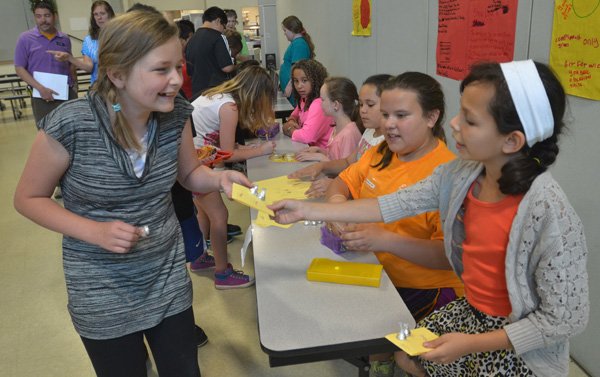FAYETTEVILLE — A group of six girls formed a semicircle around Katie Hinkel, an 11-year-old fifth-grader at Owl Creek School, during the lunch period.
“Raise your right hand and repeat after me,” Katie told her friends, leading her classmates reciting a pledge promising not to bully peers and to speak up if they see bullying occur in their school.
Above their heads was a hand-lettered sign taped to the wall in the lunchroom that read “Quit Being Rude” and “Stop Bullying.”
At A Glance
The Antibullying Pledge
Owl Creek students used a pledge found on the Cartoon Network website:
Tell a trusting adult who can step in and stop the bullying.
Be friendly to the person who was bullied, letting them know it’s not their fault.
Get involved and encourage everyone to speak up.
Source: www.cartoonnetwork.com/promos/stopbullying/speakup/index.html
“We were seeing people getting bullied in our school,” Katie said. “We’re starting a club at school. “
Katie, along with classmates Jose Torres and Deandre Washington, developed the antibullying campaign as part of a class project after a study unit on making a difference in the school and community. As a result, the students in Carri Finley’s fifth-grade language arts classes developed a variety of action plans to raise awareness or money for a variety of organizations and issues.
There were programs to raise money for childhood cancer as well as breast and ovarian cancer and diabetes. One group focused on Goodwill Industries, and another wanted to volunteer at the Fayetteville Animal Shelter, only to learn they were too young, Finley said. One group is collecting school supplies for tornado victims in Moore, Okla.
Amethyst Manasco, 11, was a member of a team selling Compliment-Grams at a table next to the antibullying team Wednesday. For 50 cents, a student could buy a Compliment-Gram, write out the compliment to a friend and have delivered to the recipient within minutes, maybe seconds.
Her team partner, Emilye Pool, who was celebrating her 11th birthday, said, “We’re spreading kindness with our Compliment-Grams. People want to spread kindness and be happy.”
The money raised from the venture will be given to the school to buy prizes for the Owl Card drawings. The Owl Card program is to motivate or encourage students to do the right thing. When observed doing a good deed, the student can receive an Owl Card that goes into a drawing for a prize.
Amethyst said, “We want to buy better prizes.”
Students selected the organization or issue they wanted to work on, developed presentations and an action plan to accomplish a goal.
“We want them to be involved in lifelong philanthropy,” Finley said.
They have learned how to overcome roadblocks and to solve problems, Finley said.
“It’s not me telling them what to do,” Finley said. “It’s me asking questions on their actions. I love the way they want to be part of the solution.”

